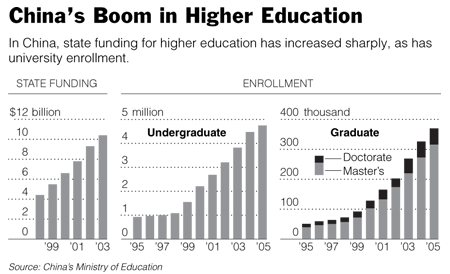|
News & Views item - October
2005 |
 China
is Spending Billions to Woo Big-name Scholars and Build First-class Research
Laboratories -- China's Latest Bid to Raise its Profile as a Great Power.
(October 30, 2005)
China
is Spending Billions to Woo Big-name Scholars and Build First-class Research
Laboratories -- China's Latest Bid to Raise its Profile as a Great Power.
(October 30, 2005)
The New York Times' Howard French reporting from
Shanghai writes, " 'First-class universities increasingly reflect a nation's
overall power,' Wu Bangguo, China's second ranking leader, said recently in a
speech here marking the 100th anniversary of Fudan [University], the country's
first modern university [and currently ranked in the 301-400 group by the
Institute of Higher Education, Shanghai Jiao Tong University]."
French goes on to say, "The model is simple: recruit top foreign-trained Chinese
and Chinese-American specialists, set them up in well-equipped labs, surround
them with the brightest students and give them tremendous leeway. In a minority
of cases, they receive American-style pay; in others, they are lured by the cost
of living, generous housing and the laboratories. How many have come is
unclear."
 |
|
Credit: The New
York Times |
However, while China is focusing on science and technology, the liberal arts
have received relatively little encouragement, the suggestion made is that they
often involve critical political, economic and historical assessments and
analyses.
"Right now, I don't think any university in China has an atmosphere comparable
to the older Western universities - Harvard or Oxford - in terms of freedom of
expression," said Lin Jianhua, Beijing University's executive vice president.
"We are trying to give the students a better environment, but in order to do
these things we need time. Not 10 years, but maybe one or two generations."
Rao Zihe, director of the Institute of Biophysics at Qinghua University said to
French, "How long it will take to catch up can't be predicted, but in some
respects we are already better than the Harvards today," but didn't elaborate.
Beijing University (ranked 15th by The Times, but placed in
the 203 - 300 group by
Shanghai Jiao Tong University]
has drawn on the talents of Tian Gang, a leading mathematician from M.I.T., in
setting up an international research centre for advanced mathematics, among
other high-level research centres at the university.
The president of Yale University, economist Richard Levin, has made the point
that when it comes to upgrading university infrastructure, China has the
advantage that new university laboratories could be built in China for US$50 a
square foot, compared with US$500 a square foot at Yale. But Professor Levin
also said "top schools have expanded much too fast and are diluting quality."
Interestingly some of the strongest criticism of the Chinese tertiary system has
come from its own academics, and ought to give the Australia's Federal and State
governments pause.
"It is important for different
universities to have different qualities, just like a symphony," said Yang
Fujia, a nuclear physicist and former president of Fudan. "But all Chinese
universities want to be comprehensive. Everybody wants to be the piano,
having a medical school and lots of graduate students." He leads a small
experimental university in Ningbo, and also criticized the lack of autonomy
given to many Chinese researchers.
"At Princeton
one mathematician spent nine years without publishing a paper, and then
solved a problem that had been around for 360 years," a reference to Andrew
Wiles and his solution to Fermat's last theorem. "No one minded that,
because they appreciate the dedication to hard work there. We don't have
that spirit yet in China."
Ge Jianxiong, a distinguished historical geographer at Fudan, said
Chinese culture often demands speedy results, which can undermine research.
"In China projects are always short-term, say three years. Then they want
you to produce a book, a voluminous book. In real research you've got to
give people the freedom to produce good results, and not just the results
they want. [Here research] has always been regarded as a tool of politics."
Andrew Chi-chih Yao, a Princeton
professor and top computer scientist, was approached by Qinghua University
in Beijing last year to lead an advanced computer studies program, and
accepted. He said to Howard French that he had expected to concentrate on
creating a world-class Ph.D. program but had found surprising weaknesses in
undergraduate training and had decided to teach at that level. "You can't
just say I'll only do the cutting-edge stuff; you've got to teach the basics
really well first."
Xu Tian, a leading geneticist who
was trained at Yale and still teaches there says, "We need a new revolution
to get us away from a culture that prizes becoming government officials. We
must learn to reward real innovation, independent thought and genuine
scholarly work."
But the greatest disquiet voiced by
Chinese academics, according to French concerns the lack of academic freedom
which permeates the culture. In illustration he cites the case of Li Ao. A
writer in Taiwan, he visited Beijing University in September and gave a speech
calling for greater academic freedom and independence from the government. The
next day, after reportedly coming under heavy official pressure, he delivered a
far tamer version elsewhere.

